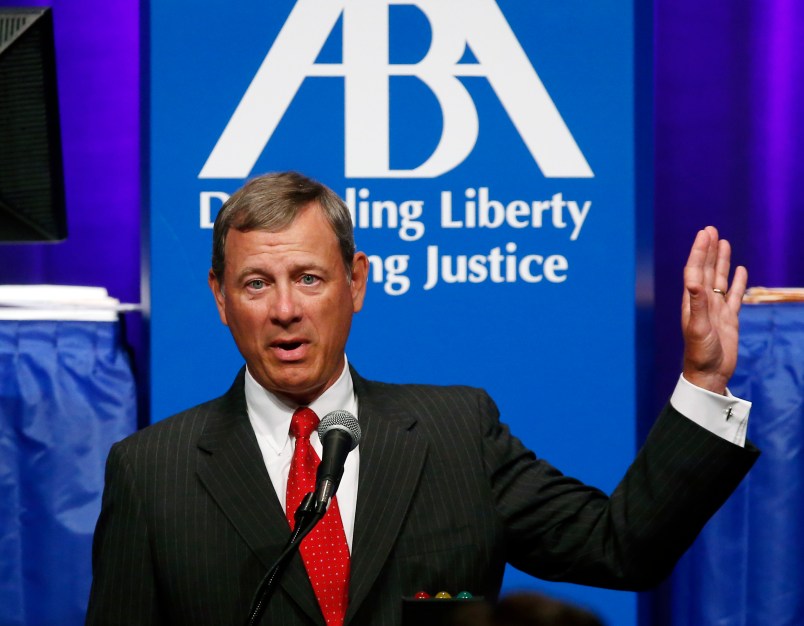BOSTON (AP) — U.S. Supreme Court Chief Justice John Roberts, speaking at the American Bar Association’s annual meeting Monday, said lawyers should play a key role in mitigating the “sharp partisan divides” that have shaken public faith in government.
“Lawyers fulfill their professional calling to its fullest extent when they rise above particular partisan debates and participate as problem solvers,” he said in a rare public speaking event before the ABA that focused on the historical significance of the Magna Carta, an English charter that turns 800 next year.
Roberts, who was appointed chief justice by then-President George W. Bush in 2005, said lawyers can help bridge the chronic partisan bickering that has gridlocked Washington in recent years “simply by helping the public understand the nature of the role that courts play in civil life, a role distinct from that of the political branches.”
On the Magna Carta, Roberts said its “core principles of justice” remain relevant today and are worth defending.
“No person, no matter how high, is above the law,” he told the lawyers in attendance. “I encourage you all, as officers of thecourts, to set your sights on the far horizon, to ensure that our legal profession continues to advance that ideal.”
Roberts said the Magna Carta, which is Latin for “Great Charter,” was meant to resolve “squabbling” between the king and land-owning barons in feudal England but touched on “fundamental freedoms” like due process rights, separation of powers, and rule of law that have reverberated through the centuries. It also warned of the dangers of “concentrated authority,” he said.
The Magna Carta marked the start of a “major undertaking in human history,” Roberts said. “It laid the foundation for the ascent of liberty.”
The document “fostered government unity in times of crisis” in England, he said, as kings re-issued and re-affirmed the decree to galvanize support from feudal barons. It also enshrined the idea of representative government by giving a council of barons a direct line to the king to discuss taxation and other governance issues.
Roberts said the document’s significance extends into American history, as revolutionaries in Boston and other colonial cities frequently invoked it as they pushed for independence from the English crown.
One of four remaining copies of the Magna Carta is currently on display at the Museum of Fine Arts in Boston until Sept. 1 and later heads to the Library of Congress in Washington, D.C. in November.
The American Bar Association, a professional organization of some 400,000 members, scheduled its meeting in Boston from Aug. 6 to 12. U.S. Homeland Security Secretary Jeh Johnson was a keynote speaker over the weekend.
Copyright 2014 The Associated Press. All rights reserved. This material may not be published, broadcast, rewritten or redistributed.







Idiot.
trying to improve his image?
He does not seem to be able to draw a parallel between his court and the partisanship on display in recent rulings. Another conservative that preaches, “do as I say not as I do”.
More like a Mr. Magoo.
Or this guy:
That’s not news. It’s the fact that he said all that stuff without vomiting, breaking down into hysterical laughter, breaking the fourth wall for a sly smirking aside to the audience like Richard the III, being struck by lightning, or just flat out dissolving away into an puddle of toxic goo due to the sheer corrosive power of the torrent of high-purity concentrated hypocrisy and mendacity that poured out of his mouth that’s news.